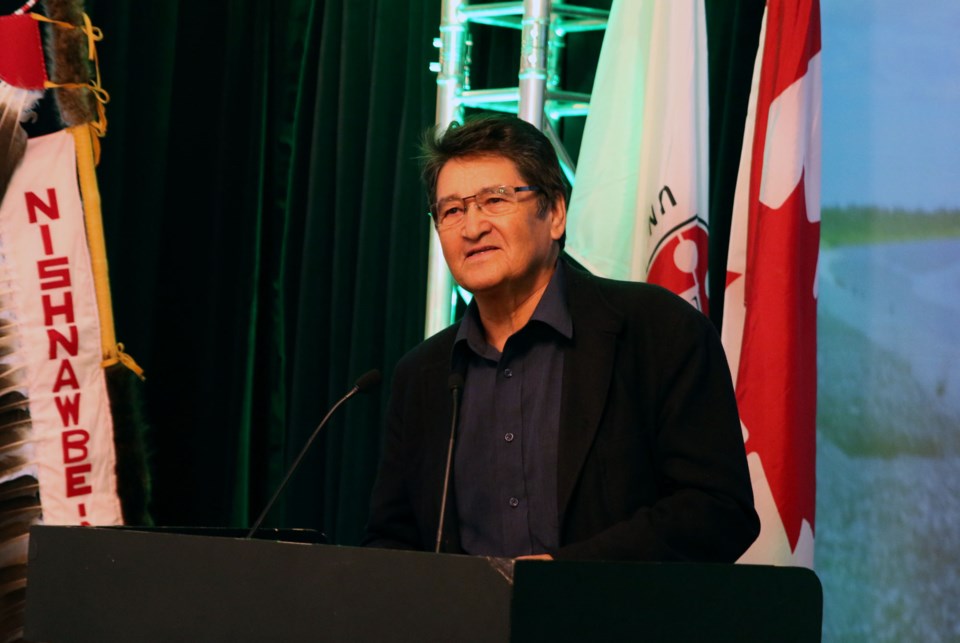THUNDER BAY – In the early morning hours of Sept. 20, 2015, Laura Shewaybick started to have difficulty breathing. Her husband, Norman, helped her walk to the nursing station in Webequie First Nation, where she used an oxygen tank to help her breathe.
But the tank was quickly emptied and all other oxygen tanks in the nursing station were empty already. Laura was airlifted to Thunder Bay by Ornge for treatment and she would pass away several weeks later.
“There wasn’t enough oxygen in the tanks for her to be saved,” said Nishnawbe Aski Nation deputy Grand Chief, Derek Fox. “When Ornge had showed up, this was just the view point of people that were there, those medical planes and helicopters that come in were better equipped medically than the whole nursing station.”
Laura’s story was just one of many Fox shared about a lack of access to even the most basic medical services in First Nation communities during his opening remarks at the NAN Health Summit in Thunder Bay.
This week, delegates from communities throughout the NAN territory, as well as health care professionals and political leaders, will be discussing the NAN health transformation process, community participation, governance possibilities, mental health and addictions, and approaches to health and community wellness.
“Everyone has their own view points of what health transformation is, but we need to put that all together and ensure that the Laura Shewaybick incident does not happen again,” Fox said.
But stories like Laura Shewaybick’s are all too common and Sol Mamakwa, MPP for the riding of Kiiwetinoong, said the health care system in Canada is killing Indigenous people.
“People don’t realize sometimes how the system is built to take away the rights of our people,” he said. “There are a lot of examples of how the system fails our people.”
One example Mamakwa used is people living in First Nation communities being required to travel to larger centres to receive treatment for illnesses, such as dialysis for diabetes. Federal funding programs only cover travel and accommodation for a period of four months and after that the person is left to pay for their own accommodation and food while receiving treatment.
With many of these individuals being elderly and living on old age pensions, being away from their family, and not speaking the language, they choose to travel back home and forgo treatment, which can be a fatal decision.
“These are real issues,” Mamakwa said. “These are real human issues. I always say that we are people too and we should be treated like that.”
Within First Nations communities, there are shortages of medical supplies and tools to properly treat people and both Mamakwa and Fox recounted touring nursing stations that lacked supplies, space, and privacy.
“You can see that in the limited access to health care services, whether its physician services, properly trained nursing services, or even access to specialty services,” Mamakwa said. “We can’t blame those individuals. We have very good nurses and very good physicians in our communities, but it is the system. They are not given the tools to be able to respond.”
Ovide Mercredi, the lead negotiator for health transformation with NAN, said there needs to be more autonomy given to First Nation communities, especially when it comes to making decisions relating to health care.
“It’s very important because it could mean life or death for our people,” he said. “Decisions about medical transportation are not made at a local level. They are made outside of the community by people with authority and that requires someone outside of the community deciding whether something is an emergency or not without seeing the situation. Or sometimes they don’t accept the recommendation of the doctors or the nurses.”
“Our people have had a health care system long before the arrival of settles,” Mamakwa added. “I’m not saying to go totally back to that, but I’m saying we need a system that is driven by the communities, driven by the people, where they have a say in how the system is going to be delivered.”
Going forward, Mamakwa said he will continue to speak out on behalf of First Nations communities in Northern Ontario at Queen’s Park and put pressure on the provincial and federal governments to not just fund health care programs, but also ensure the infrastructure is in place to allow them to operate.
Mercredi, in his role as lead negotiator, will also take what is discussed during the health summit to set up negotiations for changes in terms of legislation and governance to provide First Nation communities with equal access to health care and governance over health care systems.
“We understand that overall the health care system is always in need of improvement, whether it’s in the city’s, the municipalities, or our First Nation communities,” Fox said. “We just want to ensure when people need those basic health services that they are there for our people.”
